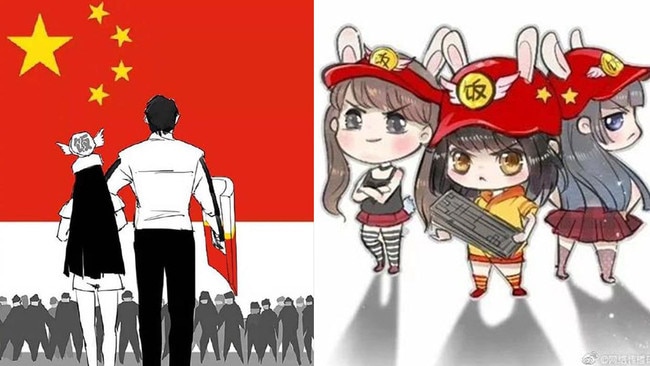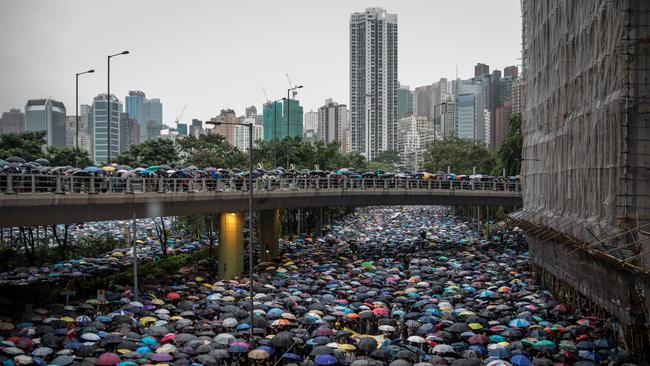China’s online soldiers: Di Bar joins forces with ‘Fan Girls’ to target Hong Kong protesters
An internet community of patriotic young Chinese join the frontline against HK protesters.

An online community of young Chinese living around the world has morphed from a group set up to ridicule a Chinese soccer player to a Chinese communist party-backed movement targeting Hong Kong protesters.
The group called Di Bar, or D8, has joined forces with “Fan Girls” — who promote their celebrity idols in the online world — to hit back at Hong Kong protesters by flooding overseas social media platforms such as Facebook and Instagram and posting eye-catching memes, slogans and posters in both Chinese and English.
China’s CCTV nightly news, the most watched news program in China and one of the favoured mediums for the state to promote government policy, on Sunday night praised the patriotism of Di Bar. Several other state media outlets echoed the praise.
“The mainstream public opinion for peace and stability in Hong Kong is undeniable. Stopping the violence and restoring order is the common wish for 1.4 billion Chinese. These days, from fanquan girls to Di Bar, netizens to overseas students, all the forces which love Hong Kong and China have united to support and safeguard the city,” China Central Television said.
According to Chinese search site Baidu, the original Di Bar subforum had created over 1 billion posts and had over 31.3 million members as of December 2018.
It is the first time Chinese state media has endorsed the internet movement, which requires participants to use a VPN or proxy to get around China’s internet firewall.
The group, mostly known for distributing spam messages and memes, over the weekend declared their “resolute support for the Hong Kong police to arrest rioters,” and stated that their mission was to “convey the voice of Chinese youth in a rational way”.
The group’s campaign was driven by “patriotism, rationality, civilisation and truth-seeking”. They called for an end to “the violence, restoring order, punishing the rioters, fighting against lawbreaking acts and reporting fair news”.
Di Bar had launched several similar “flood events’’ in recent years, including a major anti-Taiwan independence campaign targeting Taiwan leader Tsai Ing-wen’s Facebook page in 2016. Another in 2018 targeted the Facebook pages of the Ministry for Foreign Affairs of Sweden and Swedish TV figure Jesper Rönndahl over an anti-China program.
Social media giants pull plug on ‘malicious’ Chinese accounts
Twitter has suspended more than 200,000 accounts that it believes were part of a Chinese government influence campaign targeting the protest movement in Hong Kong.
The company also said it will ban ads from state-backed media companies, expanding a prohibition it first applied in 2017 to two Russian entities. Both measures are part of what a senior company official portrayed in an interview as a broader effort to curb malicious political activity on a popular platform that has been criticised for enabling election interference around the world and for accepting money for ads that amount to propaganda by state-run media organisations.
The accounts were suspended for violating the social networking platform’s terms of service and “because we think this is not how people can come to Twitter to get informed,” the official said. The official, who spoke on condition of anonymity because of security concerns, said the Chinese activity was reported to the FBI, which investigated Russian efforts to interfere in the 2016 US presidential election through social media.
After being notified by Twitter and conducting its own investigation, Facebook said it had also removed seven pages, three groups and five accounts, including some portraying protesters as cockroaches and terrorists. Facebook, which is more widely used in Hong Kong, does not release the data on such state-backed influence operations.
Twitter traced the Hong Kong campaign to two fake Chinese and English Twitter accounts that pretended to be news organisations based in Hong Kong, where pro- democracy demonstrators have taken to the streets since early June calling for full democracy and an inquiry into what they say is police violence against protesters.

Though Twitter is banned in China, it is available in Hong Kong, a semi-autonomous region.
The Chinese language account, @HKpoliticalnew, and the English account, @ctcc507, pushed tweets depicting protesters as violent criminals in a campaign aimed at influencing public opinion around the world. One of those accounts was tied to a suspended Facebook account that went by the same moniker: HKpoliticalnew.
An additional 936 core accounts Twitter believes originated from within China attempted to sow political discord in Hong Kong by undermining the protest movement’s legitimacy and political positions.
About 200,000 more automated Twitter accounts amplified the messages, engaging with the core accounts in the network. Few tweeted more than once, the official said, mostly because Twitter quickly caught many of them.
The Twitter official said the investigation remains ongoing and there could be further disclosures.
The Twitter campaign reflects the fact that the Chinese government has studied the role of social media in mass movements and fears the Hong Kong protests could spark wider unrest, said James Lewis at the Center for Strategic and International Studies.
“This is standard Chinese practice domestically, and we know that after 2016 they studied what the Russians did in the US carefully,” Lewis said. “So it sounds like this is the first time they’re deploying their new toy.”
Twitter has sought to more aggressively monitor its network for malicious political activity since the 2016 presidential election and to be more transparent about its investigations, publicly releasing such data about state-backed influence operations since October so others can evaluate it, the official said.
“We’re not only telling the public this happened, we’re also putting the data out there so people can study it for themselves,” the official said. As for state-backed media organisations, they are still allowed to use Twitter, but are no longer allowed to pay for ads, which show up regardless of whether you have elected to follow the group’s tweet.
Twitter declined to provide a list of what it considers state-backed media organisations, but a representative said it may consider doing so in the future. In 2017, Twitter specifically announced it would ban Russia-based RT and Sputnik from advertising on its platform.
With AP



To join the conversation, please log in. Don't have an account? Register
Join the conversation, you are commenting as Logout